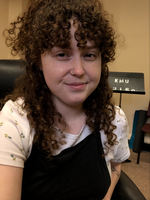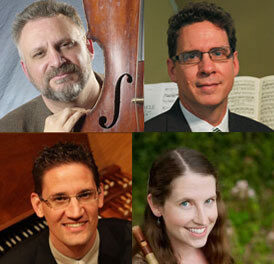The two actors on the tiny ArtsCenter stage were just young children when the horrible system of racial Apartheid formally ended in South Africa. Lucius Robinson was recently graduated from UNC-CH; and J. Alphonse Nicholson currently studies at NCCU. For these young actors, the long struggle against Apartheid’s brutal diminution of humanity is historical, not formative. That only makes their superb performances in South African writer Athol Fugard‘s powerful Blood Knot (1961) all the more impressive. That they could find so much to draw from, in their own American youths, to vivify the brothers Morris and Zachariah, in their Port Elizabeth shanty, is as painful as the play’s story. Sons of the same mother but different fathers, Morris is pale and Zachariah dark. Though it has twisted his soul, Morris can “pass;” he has options his brother does not.
StreetSigns‘ Joseph Megel (for whom the international anti-Apartheid movement would have been an important factor in forming political consciousness) directs this new production with considerable delicacy, which gives the scenes a greater emotional punch than they might have under a heavier hand. His pacing, the slow build to the shattering moment and dreary dénouement, also well serves the literary aspect of the play. We are given time to absorb the words — and Fugard is careful and precise with his words — to hear their meanings and their other meanings, to feel their shapes and rhythms.
It doesn’t take quite the same kind of courage to produce Blood Knot as part of the two-play Acts of Witness as it did to put it on in the 1960s, when this play had its one-and-only performance in Johannesburg and a run in New York — both featuring Fugard as the light-skinned Morris — but to keep recalling our attention to hard matters is bravery aplenty. Blood Knot is being presented by StreetSigns in rotating repertory with an ultra-new work, Poetic Portraits of a Revolution, performed by The Sacrificial Poets, who brought back their material from travels in Egypt and Tunisia during the “Arab Spring.” The themes of oppression, struggle, and witness supporting the abiding longing for freedom run through both. They are ageless.
There’s also a certain courage on the part of the director and actors in producing an important work like Blood Knot by a venerated author when he will be in town. This is sort of like putting on The Cherry Orchard and expecting that Chekov will stop by. UNC-CH’s Creative Writing program is hosting Fugard this month as the Morgan Writer in Residence, and the public will have several opportunities to hear him and see his work. Triangle theater-goers will already be familiar with Lucius Robinson’s nonchalant willingness to inhabit — with extraordinary taste and distinction — difficult characters, but not as many will have seen Alphonse Nicholson, who is prodigiously talented and apparently fearless as an actor. He also has a light-up-the-stage presence, but he doesn’t rely on it in his work here, which, thanks no doubt to director Megel, shows a rapid maturation. Nicholson and Robinson together make the theater fall away, as with Fugard’s words they focus our minds on a specific time in a certain place, then flip an inflection or a gesture to show us the play’s ongoing pertinence for any place where human blood makes the tie and the knot.
Through 3/20. For details, see the sidebar. And for info on Poetic Portraits of a Revolution, click here.












